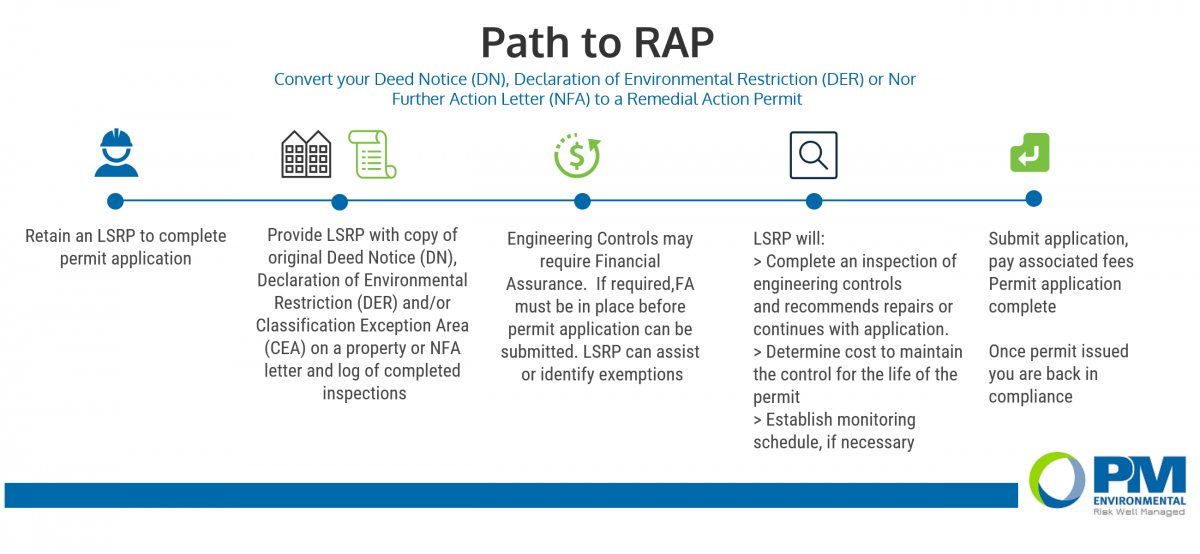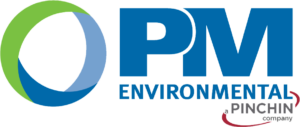Experts Corner: Time is Up New Jersey. Get Your Remedial Action Permit Now!
If you’re a property owner in New Jersey with a Conditional No Further Action Letter, you may be affected by recent regulatory changes.
Last month, PM Environmental reached out to affected property owners to offer assistance with the following changes:
- New Jersey Department of Environmental Protection (NJDEP) restructured the monitoring of all Declarations of Environmental Restriction (DER), Deed Notices and Classification Exception Areas (CEA).
- To avoid running the risk of facing potential violations, you may be required to obtain a Remedial Action Permit for your DER/DN/CEA.
What is a Deed Notice or Declaration of Environmental Restriction?
A Deed Notice or Declaration of Environmental Restriction is known as an institutional control. It is a notification added to the real title of a property when contamination remains present above NJDEP’s unrestricted use soil remediation standards.
A Deed Notice identifies the location and concentration of all contaminants left at the property, and specifies what engineering controls are required to prevent human and environmental exposure to the contamination left in place. Engineering controls include mechanisms to contain or stabilize contamination, such as a cap, cover, signs, fences and other physical access controls.
A Deed Notice often coined “pave and wave,” is usually the most cost-effective remediation of a contaminated site.
In New Jersey, if you have a No Further Action Letter issued by the NJDEP with a Restricted Use or Limited Restricted Use qualification, you will likely have a Deed Notice/Declaration of Environmental Restriction or Classification Exception Area (for contaminated groundwater only) for the property.
The NJDEP requires periodic inspection of these controls to ensure they are present and functioning as intended. For many sites, the inspection requirement is planned for up to 30 years.
What is a Remedial Action Permit?
A Remedial Action Permit is a document issued by the NJDEP Bureau of Operations, Maintenance and Monitoring pursuant to the Site Remediation Reform Act and Administrative Requirements for the Remediation of Contaminated Sites.
The permit requires the permittee to conduct monitoring, maintenance and evaluation for compliance and effectiveness of the remedial action and its associated institutional and engineering controls. The permit establishes all necessary requirements for demonstrating that the remedial action and controls continue to be protective of public health, safety and the environment.
The permit comes with an annual fee and the requirement to submit a Remedial Action Protectiveness/Biennial Certification Form. The certification form is submitted to the NJDEP, along with supporting documentation (inspection logs, photographs of the site, etc.) and is certified by a Licensed Site Remediation Professional (LSRP).
Who is Affected?
As of May 7, 2014, all persons responsible for conducting remediation (i.e. responsible parties) that have established a Deed Notice (DN), Declaration of Environmental Restriction (DER) and/or Classification Exception Area (CEA) on a property are required to apply for and receive a Remedial Action Permit. If you haven’t applied for the permit yet, be advised that the NJDEP is preparing to mass email Notice of Violation letters to affected parties requiring them to obtain the permits or face penalties.
The Good News
Obtaining a RAP for a DER/DN/CEA is relatively simple. Retaining a LSRP to assist you with the Remedial Action Permit application is the first step. The LSRP will review applicable documents, such as the Deed Notice and the Remedial Investigation Report and conduct an inspection of the engineering controls. The LSRP will either recommend repairs and/or work with you to complete the application process.
Regulations often require Financial Assurance whenever a Remedial Action Permit has an Engineering Control. Financial assurance is a fund or credit line established so the operation, maintenance and monitoring of the control can be completed in the event the person responsible for completing the remediation is no longer doing so.
In the application process, the LSRP will determine the cost to maintain the control for the life of the permit. The calculation is based on the yearly cost of maintaining the control including labor, power, sampling, and permit costs based on present value. The financial assurance mechanisms must be in place before the permit application can be submitted and may be established as a remediation trust fund, a line of credit, a letter of credit or a self-guarantee.
In general, exemptions are granted from supplying Financial Assurance for the following groups: a government entity, a person who is not otherwise liable for cleanup and removal costs pursuant to the Spill Compensation and Control Act, the owner or operator of a child care center, a public school or private school and the owner or operator of a small business who is responsible for performing a remediation at his or her business property. Your LSRP can assist in determining whether or not an exemption applies.
Biennial Certification of the Remedial Action Permit
The LSRP will determine, based upon their professional judgment and NJDEP guidance, the frequency the engineering control should be monitored. In general, inspection schedules are completed by a property owner or maintenance staff on a monthly, semi-annual or annual basis. This information is reported to the NJDEP at a minimum on a biennial basis in conjunction with the Remedial Action Protectiveness / Biennial Certification Form.
NJDEP Fees
A Remedial Action Permit carries an application fee of $940, plus preparation costs. The NJDEP charges an annual fee of $205 per year for the permit. Biennial certifications will be required at a minimum of once every two years.
Your Permit
Once the Remedial Action Permit application has been completed, it is submitted to the NJDEP for review. The NJDEP currently takes approximately 60 days to review the application and issue a Remedial Action Permit documenting future work required to maintain the permit (i.e. Biennial certifications).
About the Author
 Jonathan Lisko, LSRP, Licensed Site Remediation Professional, is PM Environmental’s Northeast regional manager is located in Eatontown, New Jersey. Lisko has nearly 20 years of extensive experience with assessment and remediation services in New Jersey. He specializes in NJDEP Regulatory Compliance, Operations and Maintenance, Remedial System Construction and Specialty Environmental Mechanical Services and was recently listed as a Dispute Resolution LSRP by the Licensed Site Remediation Professional Association (LSRPA).
Jonathan Lisko, LSRP, Licensed Site Remediation Professional, is PM Environmental’s Northeast regional manager is located in Eatontown, New Jersey. Lisko has nearly 20 years of extensive experience with assessment and remediation services in New Jersey. He specializes in NJDEP Regulatory Compliance, Operations and Maintenance, Remedial System Construction and Specialty Environmental Mechanical Services and was recently listed as a Dispute Resolution LSRP by the Licensed Site Remediation Professional Association (LSRPA).
Publication Details
Date
June 30, 2016



